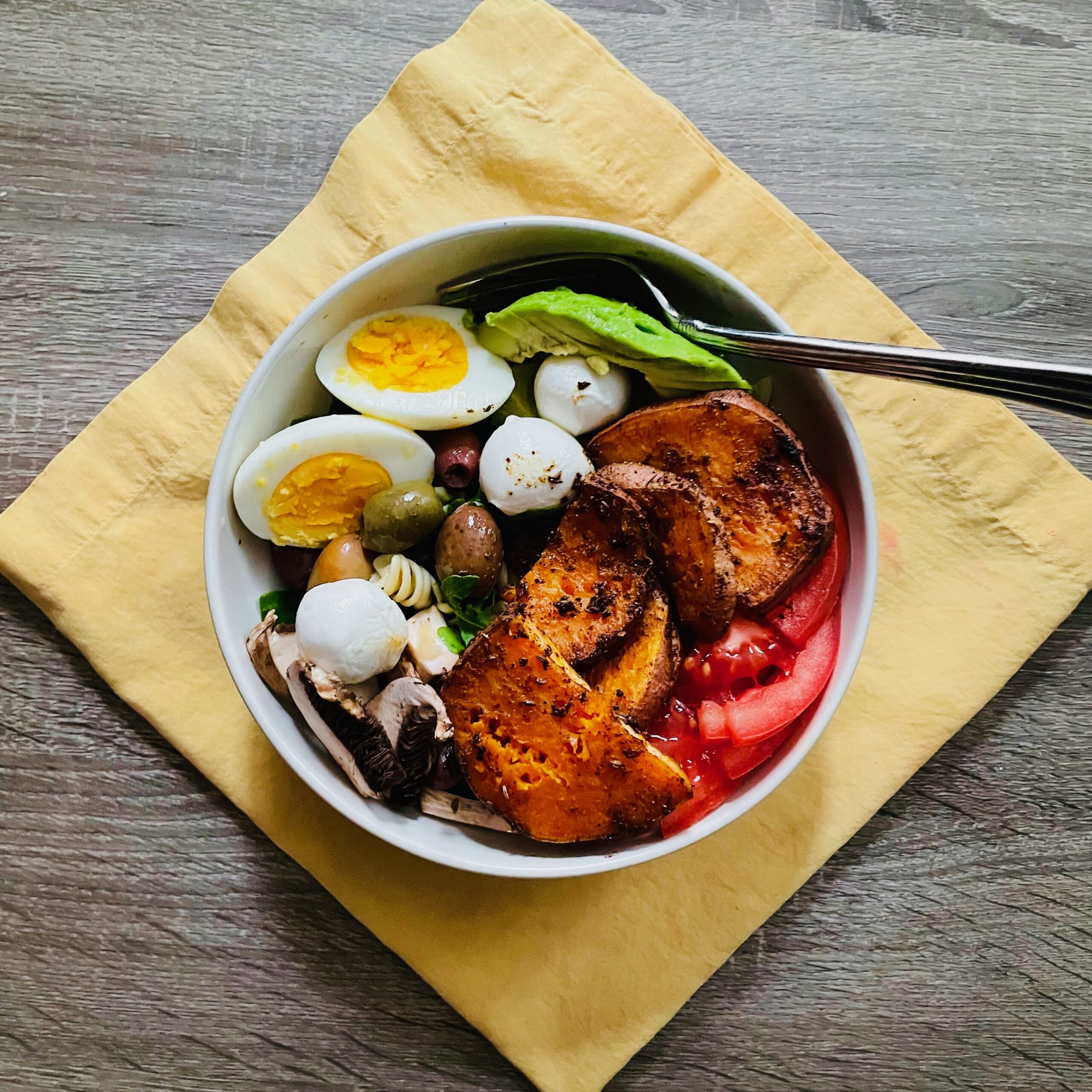On World Mental Health Day, discover how mindfulness can improve mental health, manage emotional eating, and reduce stress through holistic practices that promote better food choices and overall well-being.
Every semester, I ask my students to define the word “health” and the answers they come up with are just as vague as the original term. Sometimes they’ll say that health is the absence of disease or it’s the same as “wellness”; other times, they’ll comment on the multiple factors that make up someone’s overall health, like finances, stress, and physical activity, to name a few.
So it seemed fitting that, on World Mental Health Day, I would ask you, dear reader, to consider how you define “mental health”. I can admit that I feel stuck when asked this. I can definitely share what I know about the DSM-5 and how I have been managing my own mental health diagnosis of bipolar disorder for nearly three decades, but defining “mental health” involves so many different aspects of our lives—our thoughts, emotions, and behaviors—all of which can vary greatly from person to person. Similar to my students’ trying to define “health”, mental health isn’t just the absence of a disorder, but a dynamic state of well-being, making it hard to pin down a one-size-fits-all definition, let alone approach. While there are manuals that help professionals diagnose mental health disorders, like depression or anxiety, those focus on specific symptoms and conditions. Mental health itself, however, is more about the bigger picture of how we handle stress, relate to others, and make choices, which can be shaped by culture, life experiences, seasonal changes, and even our biology. This complexity makes the term feel vague, even though it affects all of us in some way.
Nutrition and Mental Health
Just like most conditions, there is a bidirectionality to causes and affects. What we eat might play a role in how we feel (physically and mentally) and how we’re feeling (physically and mentally) might affect our food choices and eating habits.[1,2] When experiencing depression or feelings of loneliness, isolation, or solitude, you may find yourself craving high-carb, sugary foods like bread, pasta, and sweets. Even though these foods are usually categorized as “poor quality”, they may also trigger the release of serotonin, according to some studies (which tend to focus more on weight outcomes than address mental health connections).[3] Regardless of the reason, comfort foods provide effects that are often short-lived, potentially leading to a cycle of overeating and mood crashes.
On the other hand, mental health issues may cause a loss of appetite, leading to undereating and nutrient deficiencies that worsen feelings of fatigue, low energy, and irritability. These issues may also result in a cycle that makes it harder to plan, cook, or choose healthy meals.
Key Nutrients for Mental Health
While it may be difficult to pinpoint exactly where mental health issues are stemming from, we do know that the following foods may help enhance mood, reduce stress, and support brain and energy functions, as well as maintain stable blood sugar levels that can keep you from crashing even further during a down day.
- Complex Carbs: Opt for whole grains, sweet potatoes, and legumes instead of refined carbs. These foods provide a steady release of energy and help stabilize mood.
- Omega-3 Fatty Acids: Found in salmon, flaxseeds, and chia seeds, omega-3s support brain health and can help reduce symptoms of depression.
- Vitamin D: Since sunlight is a major source of vitamin D, people with mental health issues may experience a deficiency, especially if they tend to be more reclusive. Include fortified foods or consider supplements after consulting with your healthcare provider.
- Tryptophan-Rich Foods: Tryptophan is an amino acid that helps produce serotonin. Foods like turkey, eggs, and bananas can support mood regulation.

Quelling Negative Self-Talk
If you do find yourself in slump and, if you’re anything like me, start berating yourself that you should know and do better, consider the following compassionate and constructive ways you can address negative self-talk when it creeps up:
- Acknowledge the Inner Critic: It’s okay to recognize when your inner voice is critical, but remember, it’s not always the truth. This voice comes from years of past experiences with your relationship with food and/or your body, and it’s something that may take time to overcome.
- Shift to Self-Compassion: Instead of focusing on what’s wrong, ask yourself, “What can I do to take care of myself today?” You deserve to be kind to yourself, just like you would be kind to a friend or loved one.
- Reframe Negative Thoughts: When you hear yourself saying, “It’s not worth it”, try shifting to: “I’m learning and making progress, even in small ways.” Every action you take toward prioritizing your health is worth acknowledging or even celebrating.
- Focus on What Feels Good: How do positive changes make you feel on the inside, not just when a specific outcome is reached? Try to be present in the moment and tune into what your body is telling you right now.
One of the biggest things I think can help turn negative self-talk into positive thoughts is to consider how you would speak to a loved one who was experiencing the same problem.
Mindful Eating
It may be easier said than done (and this is also recognizing the privilege that exists in this approach), but sometimes taking time to focus on our internal and external environments may help stabilize our mood. For example, do you find yourself rushing to grab something when you’re running off to work? Are you zipping through a drive-thru to make it back in time for your next meeting? Have you woken up elbow-deep in a bag of cookies or chips? Do you finish a bunch of chores while the rest of your family is seated at the dinner table? If so, you might need to integrate mindful eating into your next meals.
Mindful eating asks you to slow down and be present, savoring the flavors, being grateful for the food, and honoring your hunger and fullness. This approach also requires that you acknowledge your habits before reaching for an impulse food or a second helping. Chewing slowly can help you appreciate your meal and mindset, as can putting away screens and eating without being distracted.
There’s a correlation between vibrant colors and nutrient content; hence the recommendation to “eat the rainbow”.[4] Aside from being healthful, seeing a variety of colorful foods in front of you might also pep you up a bit. If you’re not whether you’re experiencing true hunger or merely snacking out of boredom (or stress), stop for a moment—or a few moments—and pay attention to your body cues, or ask yourself why and what you want to eat before making a decision.

Additionally, the following stress management techniques may help create a moment of mindfulness throughout the day. Whether it’s a short breathing exercise, a quick meditation, or writing in a journal, these practices allow us to slow down and reconnect with the present moment. By taking just a few minutes to manage stress, we give ourselves the opportunity to reset our minds, reduce tension, and regain focus—helping us feel more grounded and in control, even during the busiest times.
- Breath Awareness
- Moment of Stillness
- Body Scan
- Mindful Listening
- Scents/Lights
- Kindness Mantra
- Visualize a Safe Space
Creating a Strategy
Some of the things I do to keep mindful are reviewing my schedule and appointments at the start of the week. This helps me visualize any potential challenges that a busy lifestyle may bring, like not having time to stop and eat, dining out or ordering takeout many nights in a row, or being unable to replenish my staple foods at home. Blocking time to dedicate toward preparing, shopping for, and eating has helped me significantly, especially since I know in advance whether or not I’m going to have a calm eating environment or if I might need to accommodate a packed schedule or a day of interruptions.
Click here to download my FREE meal planning templates to help you keep track of your kitchen inventory, create a shopping list, and make a plan that works with your schedule.



0 Comments